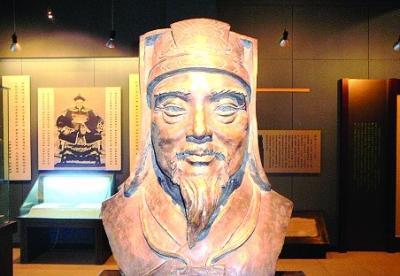Yu Que (1303–1358), courtesy name Tingxin, was a wuwei dangxiang man and a famous scholar and general of the Yuan Dynasty.

Yu Que
As a teenager, Yu Que lived with his father, who was an official in Luzhou (present-day Hefei, Anhui). When he was about 20 years old, his father died, and since then the family has fallen into the middle of the road, and in order to serve his elderly mother, he was hired to teach at the school. During this time, he befriended Zhang Heng, a disciple of the master of science Wu Cheng, with whom he often interacted with each other and discussed the scriptures, so his studies progressed day by day.
Party item people
In the first year of Emperor Yuanhuizong's reign (1333), he was admitted to the Jinshi and was conferred the title of Zhisi (知泗卅事), at the age of 30. During his term of office, he was strict in government and his subordinates were afraid. The agricultural harvest in the prefecture failed, and Yu Que asked Zhongshu Province for approval and reduction of taxes for grain-deficient peasant households, which was favored by the peasants. Later, he was ordered to enter the dynasty, and in order to serve the Hanlin script, he was transferred to the head of the Punishment Department, but because he did not want to destroy his eyebrows and bend his waist to tie up the magnates, he abandoned the official and returned home. Soon Emperor Yuan Hui invited him back to Beijing, where he was appointed as the editor of Hanlin, participating in the compilation of the three histories of Song, Liao, and Jin, and then changed to the post of Inspector Of the Imperial History, serving as a waiter in Huguanghang Province.
Yuan
In the twelfth year of Zhengzheng (1352), the anti-Yuan peasant rebel army spread all over Jianghuai, and Chen Youyi occupied the Two Lakes region. The imperial court appointed Yu Que as the deputy envoy of Huaixi Xuanwei, the marshal of jindu, and stationed troops in Anqing. At that time, there was a great drought between the north and the south, and the soldiers' food and food were very scarce; in this situation, in addition to paying close attention to the training of the army and repairing the defense of the city, he also carried out the reclamation of tun tian and the famine, obtained 30,000 grain, supplemented the military grain, and reduced the peasants' burdens. He donated his own money to buy rice to save the disaster victims, raised 30,000 ingots of money, helped the disaster victims restore production, and left many commendable political achievements.
Map of the peasant revolt at the end of the Yuan Dynasty
In the autumn of the fifteenth year of Zhengzheng (1357), Yu Que was appointed as the governor of Huainan Province, and soon changed to Zuo Cheng (左丞) and was given the crown of Erpinguan (二品官). Yu Que became more and more diligent and vowed to repay the country with his death. In October of that year, Chen Youyu led his army east along the river, and Yu Que led his men to block the attack at Anqing. He and his generals were guarded day and night, and more than a dozen wounds were inflicted. In the eighteenth year of Zhengzheng (1358), on the seventh day of the first lunar month, the city was destroyed, and Yu Que, unwilling to be captured and humiliated, drew his sword and fell into the Yangxi Qingshui Pond and died at the age of 56. Chen Youyu admired his loyalty and courage and was buried outside the west gate of Anqing City. Emperor Yuanshun posthumously made him a duke of the country with the posthumous title of "Zhongxuan". Ming Taizu Zhu Yuanzhang also built a temple for Yu Que in Zhongjiefang. The famous literary scholar Song Pai established a biography for him.
Zhu Yuanzhang
Yu Que has a deep foundation in classics, and has a good literary literacy, with excellent poetry and calligraphy. In his spare time in the military, he made annotations to the "No Classic" and also taught traditional cultural knowledge to soldiers. His poetic style is simple and elegant, easy and smooth, with the legacy of the Southern Dynasty poets. There is a collection of essays "Qingyang Collection" passed down and included in the "Four Libraries Complete Book". He was also good at writing seals and li, and the Yuan Shi said that his calligraphy was ancient and elegant. Yu Que was also a long-time scholar and a rare Confucian general at the end of the Yuan Dynasty.